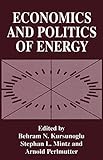Economics and politics of energy Libro electrónico edited by Behram N. Kursunoglu, Stephan L. Mintz, Arnold Perlmutter
Tipo de material: Libro
en línea Idioma: Inglés Series Detalles de publicación: New York Plenum Press c1996Descripción: xvii, 238 páginas ilustraciones mapas 26 centímetrosISBN:
Libro
en línea Idioma: Inglés Series Detalles de publicación: New York Plenum Press c1996Descripción: xvii, 238 páginas ilustraciones mapas 26 centímetrosISBN: - 0306453878
- 9780306453878
- 9780585342887
- Disponible en línea
Incluye bibliografía e índice: páginas 237-238
Presentations on the international conference on economics and politics of energy.. Chapter 1. - Global energy demand projections in the coming century, driven by population, economics and energy efficiency.. Chapter 2. - Energy supply projections of primary fuels, renewables, conservation, and nuclear power.. Chapter 3. - The next fifty years of the peaceful application of nuclear energy.. Chapter 4. - Nuclear power growth, nonproliferation, and politics of nuclear energy.. Chapter 5. - International management of nuclear power fuel systems.. Chapter 6. - Relevance of international consensus policies on alternative national energy strategies as related to free market economic, global fuel transportations systems for oil and gas, environmental impact and geopolitical trends
Disponible para usuarios de ECOSUR con su clave de acceso
The 1995 conference was organized around two closely related themes and focused on the two pivotal aspects of energy, that is, economics and politics, both of which are decisive in providing long-term national and international strategies for the next century. Originally the program was going to include the participants from the new oil powers in Central Asia and Caucasus, newly independent from the former U.S.S.R. However, probably both economics and politics prevented their participation. Global energy projections, technological changes such as nuclear power and the fuel geopolitics of the coming century will be the basis for political and strategic planning. Based on the scenarios of likely global economic and population growth and of new energy technologies, what are foreseeable scenarios for the geopolitics of energy a half century ahead? What fresh worldwide systems should we start now? The political problems with profound economic impact could include, for example, the significance of the continuing worldwide growth of nuclear power, with such issues as the use of Highly Enriched Uranium (HEU) and Plutonium obtained from the dismantling of U.S. and former U.S.S.R. nuclear weapons; the urgency of nonproliferation; the disposal of civilian and military nuclear waste; and, nuclear power alternatives. In spite of U.S. reluctance, the increasing role of nuclear power is becoming apparent in several countries, and its potential has become an important political factor today. Inglés
Disponible en línea
Disponible en formato PDF


